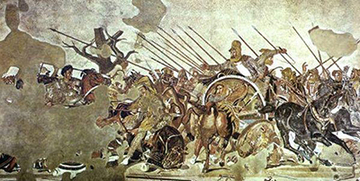Also on this page:
Greece History,
History Of Greece,
More History Topics
More Topic Categories
Greek History
 Greek history consists of the history of the Greek tribes and civilization from their appearance until our times. Although Greece became an independent state in 1828, Greek history spans beyond the borders of the modern state and back in time to the depths of the past. In general, Greek history is broken down in various eras, which are not clearly defined. These are:
Greek history consists of the history of the Greek tribes and civilization from their appearance until our times. Although Greece became an independent state in 1828, Greek history spans beyond the borders of the modern state and back in time to the depths of the past. In general, Greek history is broken down in various eras, which are not clearly defined. These are:Before 3000 BC – 1420 BC: the Minoan Civilization
Before 1600 BC: the Aegean Civilization
1600 BC – 1100 BC: the Mycenaean Civilization
1100 BC – 800 BC: the Dark Ages or the Geometric Era
800 BC – 500 BC: the Archaic Era
500 BC – 323 BC: the Classical Era
323 BC – 146 BC: the Hellenistic Period
146 BC – 330 AD: the Roman Period
330 AD – 1453 AD: the Byzantine Period
1453 AD – 1821 AD: the Ottoman Period
1821 AD – Today: Modern Greece
The Homeric Epics are considered the first written account for Greeks, and are dated to around the 8th century BC. Although documents from the much older Mycenaean Era have been found, they are written in primitive Greek and none of them is a historical account. Nevertheless, it is widely accepted today that the history of Greece began around the Late Bronze Period, marked by the appearance of the first great Greek civilization, the Mycenaean. It was later found that the Mycenaean civilization was the evolution of two previous civilizations, the Minoan and the Aegean. The Mycenaean civilization was invaded by the sea people and the Dorians and collapsed around 1100 BC, leading Greece to a dark age, during which a considerable decline in population and literacy was recorded.
After the 8th century BC, Greece started recuperating and emerged from the Dark Ages. This eventually culminated in the Classical Greek period, marked by a Golden Age in Athens, during which literacy, society and culture evolved considerably. This period was also marked by the Persian Wars, during which the Persians tried to subjugate Greece. After the Greeks successfully repelled the Persian troops, Alexander the Great emerged, and, having received a unified kingdom from his father, he started a campaign against the enemy. He eventually managed to expand Greek territory to the depths of Asia, reaching the borders of India. However, Alexander died shortly afterwards, marking the start of the Hellenistic Period.
During the Hellenistic period, the Diadochi (successors of Alexander) clashed together in an effort to gain power and the Greek Empire soon crumbled. In 146 BC, the Greek Empire fell in Roman hands, effectively ending the Hellenistic period. The Roman period followed, and after the moving of the capital to Byzantium (later Constantinople), a new power emerged, the Byzantine Empire. This period was characterized by economic prosperity, cultural boost, as well a series of wars. Among them, the Fourth Crusade was the most important event for the Empire, as Constantinople was conquered by crusaders for the first time. Later, the Ottomans arrived and 1453 marks the year of the end for the Byzantine Empire and the start of a four – century Ottoman rule for Greece.
The Modern Greek state was established in 1828 after the Greek Revolution of 1821. During the 19th and early 20th centuries, Greece managed to expand its boundaries to include the then subjugated Greeks of the Ottoman Empire. Greece participated in World War I on the side of Entente, and later the Greco – Turkish War of 1919 broke out. During World War II, Greece greatly contributed to the Allied forces and efforts and was liberated in 1944. A five – year civil war broke out afterwards. During the 1950s and 1960s, Greece invested in tourism. In 1967, democracy was overthrown by a military coup d’état and the Regime of the Colonels followed. In 1974, democracy was restored and since then, Greece recovered significantly. Since 2009, Greece has been plagued by a financial crisis, triggered by the Great Recession of 2008 and the sovereign debt of the country.
See Also:
 Athens Photos
Athens Photos
 Santorini Photos
Santorini Photos
 Crete Photos
Crete Photos
 Meteora Photos
Meteora Photos
 Corfu Photos
Corfu Photos

